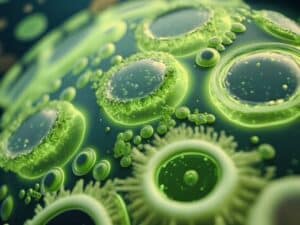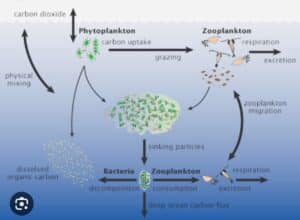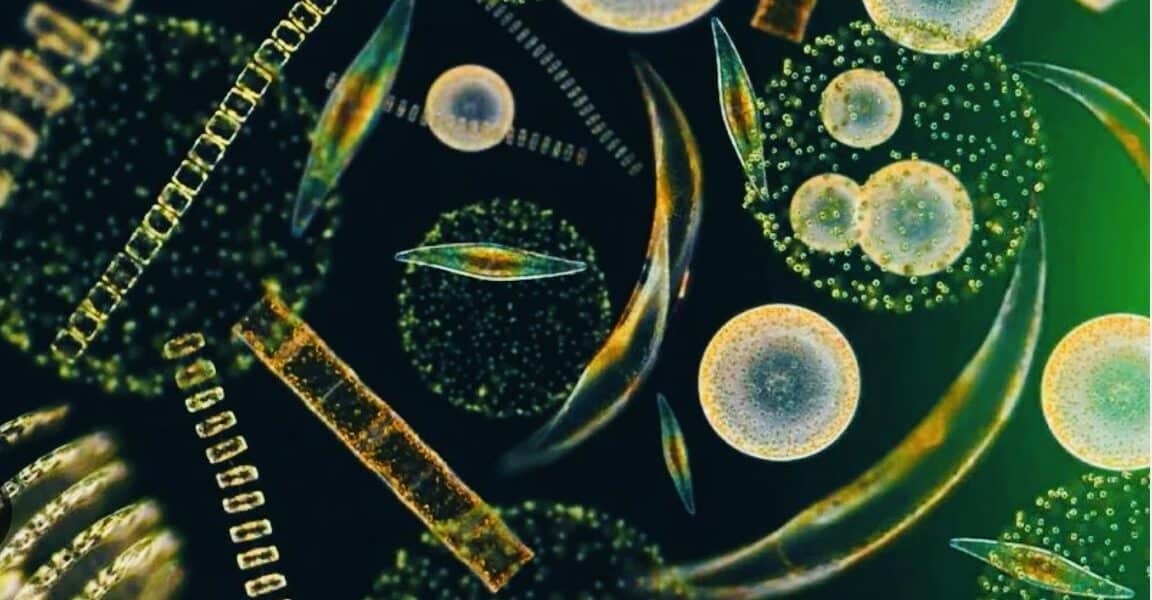By Sumaiya Farheen and Andrew Siyabalawatte, July 2023.
Plant-Based Powerhouse- Marine Phytoplankton, why eat the fish when you can eat the fish source?

Understanding Marine Phytoplankton
Marine phytoplankton, also known as microalgae, are microscopic, single-celled organisms that inhabit the Earth’s oceans, lakes, and even freshwater bodies.
They are the foundation of the aquatic food chain, converting sunlight and nutrients into organic matter through photosynthesis. Although they are small, they play a crucial role in maintaining the delicate balance of our planet’s ecosystems.
Phytoplankton, are similar to terrestrial plants in that they contain chlorophyll and require sunlight in order to live and grow. Most phytoplankton live in cooler, nitrogen-rich parts of the ocean, such as the north Atlantic and Pacific areas.
Does Marine Phytoplankton Really Work?

Marine phytoplankton, known for its rich nutritional profile, is often considered a nutrient-dense superfood. Some studies have shown promising results regarding the potential benefits of marine phytoplankton.
A Vegan Omega-3 Powerhouse

While fish and fish oil are commonly associated with Omega-3 fatty acids, marine phytoplankton is an exceptional vegan alternative.
These tiny organisms are rich in two types of Omega-3s: eicosapentaenoic acid (EPA) and docosahexaenoic acid (DHA).
Marine Phytoplankton- Nature’s Omega-3 Expressway, Skipping the Plant-Based Conversion Journey.
Vegan Omega-3 liquid supplements
Heart Health– Omega-3s support cardiovascular health by promoting healthy cholesterol levels, maintaining blood pressure, and reducing inflammation.
Brain Function– DHA, a component of Omega-3s, plays a crucial role in brain development, cognitive function, and overall mental well-being.
Joint and Inflammation Support– Omega-3s possess anti-inflammatory properties that can help reduce joint discomfort and promote overall joint health.
Omega-3 Breakdown
Here are the three most common Omega-3’s –
Eicosapentaenoic acid (EPA): EPA’s main function is to produce chemicals called eicosanoids, which help to reduce inflammation and promote joint health.. EPA may also help reduce symptoms of depression and improve mental health.
Docosahexaenoic acid (DHA): DHA makes up about 8% of brain weight and contributes to brain development and cognitive function.
Alpha-linolenic acid (ALA): ALA can be converted into EPA and DHA. ALA benefits the heart, by moderating blood pressure, thus enhancing heart function. immune system, and nervous system.
The Synergistic Benefits of Vegan Omega-3-6-9

“Omega-3 and Omega-6 are known as polyunsaturated fats, a type of fat your body can’t make”
The trio of vegan Omega-3-6-9 fatty acids offers a powerful combination for supporting overall health and well-being.
Omega-6
Like Omega-3, Omega-6 fatty acids are also essential, so you need to obtain them from your diet.
Omega-6 fats provide your body with energy, it is however more important to consume more omega-3s than omega-6s.
Omega-9
Omega-9 fats are nonessential fats that your body can produce. Thus it is seen as less important than Omega-3 and 6.
Embracing a balanced plant-based diet, rich in diverse sources, unlocks the synergistic benefits of essential fatty acids.
Amplify heart health, brain function, skin vitality, and joint well-being with Omega-3-6-9.
10 Key Benefits of Marine Phytoplankton
Boosts Cellular Energy
Anti Inflammatory
Tonic for Immune System
Improved Joint Health
Better Skin
Improved Cardiovascular Function
Helps Regulate Blood Sugar
Destroys Viruses
Improved Liver and Kidney Function
What is the Recommended Dosage of Marine Phytoplankton?
Since all supplements vary widely in terms of the actual strain of plankton used, whether the product is in powder or liquid form, how it’s been dried (for powder), and whether any filling or bulk agents have been used (a huge issue in the ‘green powder’ industry), there’s no set dosage for them.
How Much Marine Phytoplankton Should I take per Day?
Most people find 1g per day, which is half of a level teaspoon (two capsules) to be an ideal amount.
Reduces the Risk Of Heart Disease…Risk Free and Naturally
Research has indicated that dietary omega-3 fatty acids can help reduce the risk of heart disease, particularly in those who eat dietary sources of fish oil at least twice a week.
Phytoplankton and Inflammation
Individuals with arthritis who incorporate a daily dose of a teaspoon or two of phytoplankton in their diet may experience improved muscle mobility and reduced inflammation. Moreover, phytoplankton contains Pantothenic Acid (B5), which may be helpful for both osteoarthritis and rheumatoid arthritis.
“A Much Higher Quantity Of Omega-3 Than That Found In Fatty Fish”
However, this same compound is present in phytoplankton, and in much higher quantities. With this discovery, marine phytoplankton capsules with a high concentration of omega-3 fatty acids are now available.
Marine phytoplankton stands as a unique and powerful vegan source of Omega-3 fatty acids. Abundant in EPA and DHA, sustainably cultivated marine phytoplankton captivates those seeking plant-based alternatives. Embrace the ocean’s secret, unlock its nutrient-rich superfood, and thrive with health-conscious choices.
Remember, the tiniest organisms can often hold the most significant surprises, and marine phytoplankton is undoubtedly one of them.

